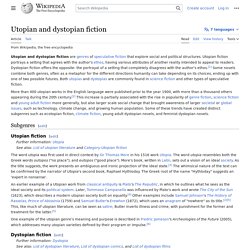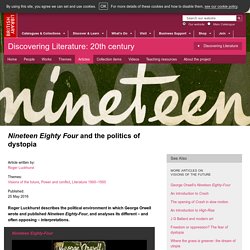

History - Historic Figures: George Orwell (1903 - 1950) Video SparkNotes: Orwell's 1984 Summary. George Orwell and 'The Ministry of Truth': Dorian Lynskey in Conversation. George Orwell's 1984: Why it still matters - BBC News. Utopian and dystopian fiction. Utopia and dystopia are genres of speculative fiction that explore social and political structures.

Utopian fiction portrays a setting that agrees with the author's ethos, having various attributes of another reality intended to appeal to readers. Dystopian fiction (sometimes combined with but distinct from apocalyptic literature) offers the opposite: the portrayal of a setting that completely disagrees with the author's ethos.[1] Many[quantify] novels combine both, often as a metaphor for the different directions humanity can take, depending on its choices, ending up with one of two possible futures.
Both utopias and dystopias are commonly found in science fiction and other speculative-fiction genres, and arguably are by definition a type of speculative fiction. More than 400 utopian works were published prior to the year 1900 in the English language alone, with more than a thousand others appearing during the 20th century.[2] Subgenres[edit] Utopian fiction[edit] Dystopian fiction[edit] DefinitionCharacteristics. Nineteen Eighty-Four. Nineteen-Eighty-Four is a novel published by George Orwell in 1949.

It was his last work, written shortly before his death from a tubercular haemorrhage in 1950. It presents a dystopian view of a world which has been taken over by totalitarianism. The novel’s main protagonist, Winston Smith, briefly attempts small forms of resistance against the Party, which rules with the figurehead of Big Brother. In the ideological context of the mid-20th-century cold war between American-style capitalism and the communism of the Soviet Union, the novel was frequently co-opted as a propaganda tool. Orwell himself intervened in the press to correct the impression that it was a wholly anti-socialist novel, rather than one which is critical of all forms of totalitarianism.
Indeed due to its vast popularity, Orwell scholars such as Bernard Crick have complained of its widespread misinterpretation; it should, Crick suggested, be read as a satire in the vein of Jonathan Swift. George Orwell. Biography George Orwell was the pseudonym of Eric Arthur Blair, born in Motihari, Bengal, India, in 1903, to a family which he described in The Road to Wigan Pier (1937) as ‘lower-upper middle class’: ‘upper-middle class without money’. According to his biographer Bernard Crick, Orwell used a pseudonym ‘partly to avoid embarrassing his parents, partly as a hedge against failure, and partly because he disliked the name Eric, which reminded him of a prig in a Victorian boys’ story’. He worked hard and won a place at Eton but while there dedicated himself more to reading widely than passing exams.
Rather than going on to University, he took the Indian Civil Service exams and became a policeman in Burma in 1921 – he was probably the first and only old Etonian to attend the Burmese police training academy. His experiences inspired his first novel, Burmese Days, which was published in New York in 1934 (British publishers feared libel cases). Biography. Nineteen Eighty-Four and the politics of dystopia. Roger Luckhurst describes the political environment in which George Orwell wrote and published Nineteen Eighty-Four, and analyses its different – and often opposing – interpretations.

Nineteen Eighty-Four Dust jacket of the first edition of George Orwell’s novel Nineteen Eighty-Four, first published in 1949. View images from this item (1) Usage terms Front cover: © Reproduced by permission of The Random House Group Ltd. Except as otherwise permitted by your national copyright laws this material may not be copied or distributed further. Nineteen Eighty-Four. Nineteen Eighty-Four. George Orwell’s Nineteen Eighty-Four. So we’re in the Senate House of the University of London. This is an enormous 1930s tower that dominates the landscape that it’s over, and Orwell was interested in it, his first wife Eileen worked here, and in the Second World War it was the headquarters of the Ministry of Information, which controlled the press, propaganda and censorship.
So in many ways very much like the Ministry of Truth in the novel. And he would see this building every day, and it stands proud above its landscape. And of course that landscape in the 1940s after the end of the war was a pretty rotten one. It was full of bombed buildings, it was full of poverty, it was a world of a country almost bankrupt, and Orwell would look around at this sort of devastation around him, and that feeds in so much to what the novel looks like.
Caption: A novel about writing So Winston works for the Ministry of Truth, and what he has to do is revise the past. Caption: Hatred and love Caption: A continual present tense.